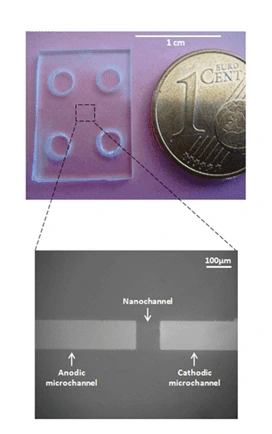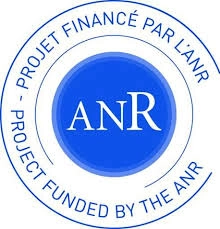Nanofluidic immunoassays to replace ELISA tests: Diflusel
Author
Christa Ivanova, PhD
Publication Date
September 14, 2021
Status
Keywords
ELISA
Fluidic Chips
nanofluidic immunoassays
electro-osmotic flow
preconcentration methodology
pathogenic analytes
medical diagnostics
Your microfluidic SME partner for Horizon Europe
We take care of microfluidic engineering, work on valorization and optimize the proposal with you
This project aims to use new effects at the nanoscale to develop a universal device to selectively preconcentrate any molecules of interest by a factor of 1000 in just a few minutes.
This technology appears to be vastly more efficient than current ELISA immunoassays.
A nanofluidic system designed to replace ELISA immunoassays: introduction
An immunoassay is a biochemical test that detects and quantifies a particular analyte in a sample based on its ability to act as an antigen.
Enzyme-linked immunosorbent assays (ELISA) rely on an antibody’s innate capacity to bind to a molecule’s unique structure.
The Diflusel project aims to design and study a novel immunoassay device based on a new method of selective electro-preconcentration with fluidic chips bearing a nanochannel.
Academic research and published results have already demonstrated that preconcentration regimes could be controlled by introducing a nanochannel in fluidic chips.
However, the location of the preconcentration strongly depends on the mobility of the analyte under the electric field.

A nanofluidic system designed to replace ELISA immunoassays: project description
To obtain selectivity, we propose a novel preconcentration methodology in this project that uses additional hydrodynamic pressure to ideally monitor the competition between electrophoretic and electro-osmotic flows. This new electro-preconcentration method enables an exact adjustment of the location of the different pre-concentrated analytes.
Selectivity is reached because the preconcentration and separation of the analytes are obtained in one single step.
Since these micro-nanofluidic devices offer a fast preconcentration time of around one minute, this new methodology is a real breakthrough compared to conventional ELISA immunoassays.
Our recent experimental results confirm that this additional pressure significantly improves the preconcentration rate. The purpose of the DIFLUSEL project will be to demonstrate that the limit of detection (LOD) can be 100 times lower than the LOD of conventional immunoassays. Thus, pathogenic analytes at deficient concentrations in the femtomolar regime should be detected based on this new methodology.
This project will have critical practical applications for defense and civil applications, such as medical diagnostics.
This project is ongoing through a partnership between the Microfluidics Innovation Center and an academic group specialized in nanofluidics (LPN CNRS).
This project was funded by the French National Research Agency (Agence Nationale de la Recherche, ANR) under the No ANR13-ASTR-0035 (Diflusel).

Check our Projects
FAQ – Nanofluidic immunoassays to replace ELISA tests: Diflusel
In a single sentence, what is Diflusel?
Diflusel is a nanofluidic research project that employs electric fields and designs smart nanochannels to concentrate analytes 1000-fold in only a few minutes, with the clear goal of doing better and eventually replacing traditional ELISA immunoassays.
What is the reason to attempt to replace ELISA?
Classic ELISA is stable and established, though it is rather slow, multi-step and its limit of detection is not always adequate when very low-abundance biomarkers are required. Diflusel hopes to break the rules and take the effort upstream: rather than straining the chemistry, it preconcentrates analytes of interest in a chip of nanofluidic dimension, such that even very dilute analytes can be detected by less complex downstream readouts.
What is the mechanism of operation of the Diflusel nanofluidic preconcentration?
The main principle is to incorporate a nanochannel in a microfluidic chip and impose an electric field over it. The electro-preconcentration effect in earlier nanofluidic studies can be applied in such geometries to push the analytes into extremely small volumes- this is precisely the electro-preconcentration effect demonstrated in earlier nanofluidic studies. Diflusel does one better: it provides a controlled hydrostatic pressure to adjust the relationship between electrophoretic forces and electro-osmotic flow to allow placing the pre-concentrated plug in the exact position along the channel.
What is different with Diflusel than with previous electro-preconcentration?
Past research demonstrated that it is possible to concentrate molecules in nanochannels but the position of the concentrated area was highly dependent on the mobility of each analyte in the electric field and this reduced selectivity. Diflusel proposes a new approach: the extra pressure can be injected with a certain attention, and thus a close control of the competition between electrophoresis and electro-osmosis is possible and consequently the precise location of each analyte preconcentrating and separating within the apparatus. This implies that preconcentration and separation are performed in one stage.
What is the rate (and strength) of the preconcentration?
The micro-nanofluidic devices that have been developed in Diflusel achieve preconcentration times of the order of one minute, and experimental results have confirmed that the pressure added to the device greatly increases the rate of preconcentration. Comprehensively, the instrument is planned to increase the analytes by approximately 1000 times within several minutes, which is ground breaking compared to the hours of work in most ELISA procedures.
What does this imply as far as sensitivity is concerned in relation to the normal immunoassays?
The goal of the project is high: it is intended to achieve a limit of detection that is 100 times lower than traditional immunoassays. Practically, Diflusel is designed to be capable of detecting pathogenic analytes at femtomolar concentrations, which is usually much lower than the limit of many conventional ELISA systems. This gives access to earlier diagnosis, and to the detection of biomarkers that are found at extremely low concentration in blood, serum or other biofluids.
What is the reason to refer to it as a universal preconcentration device?
Since the principle is not associated with a specific molecule or assay. Nanofluidic architecture and pressure-field tuning is set up that will selectively preconcentrate any molecule of interest, provided it has some charge and can be characterized by its mobility. This makes Diflusel a front-end module which can supply many downstream detection schemes (optical, electrochemical, immunofluorescence, etc.) but not a single proprietary assay.
What are the primary places of application that are envisioned by Diflusel?
Defence and civil applications are explicitly stated in the project, and the medical diagnostics are predominantly mentioned. Ideally, this is pathogen and toxin detection, ultra-sensitive biomarker measurement in clinical specimens, and possibly high-risk environmental monitoring where it is important to see trace levels in a short time. A Diflusel-type preconcentration block would be a game-changer in any area of ELISA that is currently a bottleneck in either speed or sensitivity.
What are Diflusel scientific and industrial partners?
Diflusel is developed on the basis of collaboration between microfluidics Innovation Center (MIC) and an academic team of nanofluidics at LPN CNRS that combines the industrial design of microfluidics with an excellent understanding of the transport phenomena in the nanoscale. The project is under the funding of French National Research Agency (ANR) on a grant ANR13-ASTR-0035.
What is the actual involvement of MIC in the Diflusel project?
MIC has the task of transforming the nanofluidic ideas into practice, into robust chips and systems: developing the micro-nano architectures, incorporating the control of pressure and electric-field, ensuring that the device will act predictably in the non-idealized environments. It is quite similar to the overall work of MIC in Horizon Europe and ANR projects: to translate state-of-the-art physics into instrumented prototypes, which can be practically used by researchers and companies. On several European calls, consortia containing MIC have, on average, the probability of their proposal succeeding about twice the official Horizon baseline statistics, mainly due to the fact that reviewers have confidence in the microfluidic, automation and valorisation work packages.
What is the level of maturity of the technology?
Diflusel is reported to be a completed project on the MIC web site, and nanofluidic devices are already capable of demonstrating rapid preconcentration and a direction to 100x the limits of detection of conventional immunoassays. The platform is in the TRL 4-5 category in terms of Technology Readiness: it has been proved in laboratory and in the relevant conditions of the experiments, and it has a straightforward road to integrated diagnostic modules, when the industrial or clinical partners get involved.
What can a Horizon Europe consortium do to develop Diflusel?
Diflusel is a potential front-end enrichment module of the next-generation diagnostic systems in a new consortium:
interfere nanofluidic preconcentration with miniature optical or electrochemical sensors,
applying the strategy to multiplexed arrays of biomarkers,
or inserting the chips in automated sample-to-answer devices.
MIC has a capability of chip design, micro and nanofabrication, fluidic and electrical control and prototype integration, and academia and clinical collaborators offer biomarkers, validation cohort and regulatory know-how. Practically, the involvement of a dedicated SME such as MIC does not only introduce the microfluidic hardware to the plan- it also highly enhances the methods, implementation and impact parts of Horizon Europe proposals.